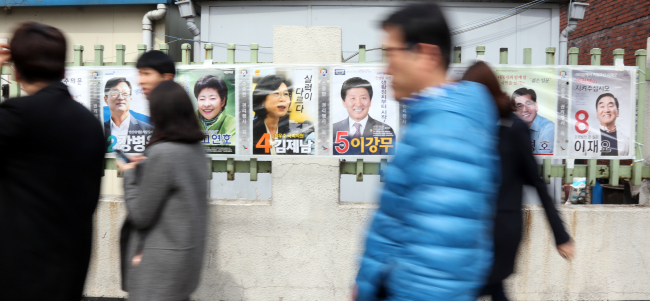A tug-of-war continued Thursday over whether to form a coalition against the ruling party before the April parliamentary election, as the two main opposition parties remained at odds over the idea that might be crucial to their election victory.
With the third-biggest People’s Party being adamant about their rejection of nominating single opposition candidates in constituencies nationwide, the main opposition The Minjoo Party of Korea urged them to consider unifying candidates at least in tough battlegrounds such as Seoul.
 |
| Pedestrians walk past campaign posters for candidates running in the April 13 general election in Seoul on Thursday. (Yonhap) |
“I am worried about the possibility of the divided liberals losing the elections,” said Jeong Jang-sun, chief strategist for the Minjoo Party’s election campaign. He suggested that the party was willing to withdraw its candidates in some constituencies even if they are more favored to win than minor party candidates.
The proposal reflected the party’s mounting concern over the coalition deal that has been caught in a stalemate despite the tight deadline. Unless the parties agree to name single candidates before April 4, those who drop out of the race will be specified as candidates on ballots.
Among the 122 constituencies in Seoul and nearby metropolitan areas, 105 are being contested between a candidate from the ruling Saenuri Party and multiple opposition candidates. The region is home to about 50 percent of the 253 seats elected through direct constituency votes.
But the People’s Party, comprised of Minjoo defectors, has so far refused to budge on forming a coalition. The party leadership reiterated that they would not seek to reach a deal with the main opposition over building a collation nationwide, in an apparent show of their determination to remain a “third political force.”
“I think our candidates are in a better position to attract voters’ support,” said People’s Party leader Rep. Ahn Cheol-soo. “If the main opposition does not want to come down in history (as the one that ruined the elections), they should make way for our candidates.”
Yoon Hee-woong, senior researcher at the Korea Society Opinion Institute, noted that a coalition among opposition parties has the potential to appeal to liberal voters despite their election pledges and political ideology being different.
“The liberal voters are likely to support single opposition candidates because they have the tendency to rally behind the anti-Saenuri sentiment,” Yoon said. “But, we could see limited impact when the voter majority proves to be supporters of the People’s Party seeking to challenge the parties’ political duopoly,” he said.
By Yeo Jun-suk (jasonyeo@heraldcorp.com)

